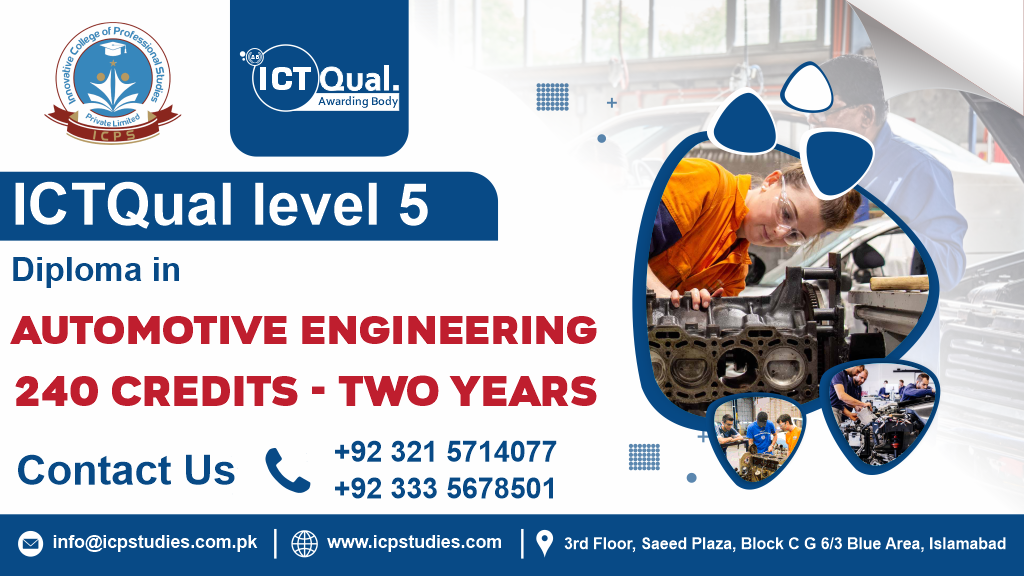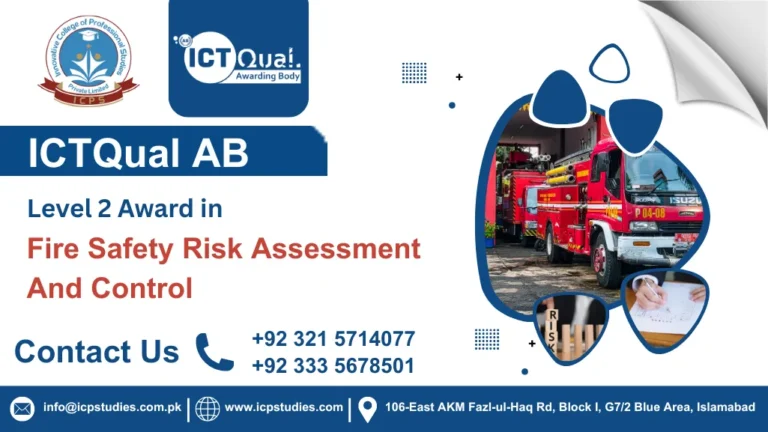Are you passionate about automotive technology and looking to enhance your skills in the dynamic automotive engineering sector? The ICTQual Level 5 Diploma in Automotive Engineering is an advanced, industry-recognized qualification designed to provide you with the practical expertise and theoretical knowledge required for a successful career in automotive engineering. This two-year course offers 240 credits, preparing you for a range of roles in the automotive industry.
The ICTQual Level 5 Diploma in Automotive Engineering is a comprehensive qualification that equips students with an in-depth understanding of the principles, technologies, and practices in automotive engineering. Over the course of two years, students will study essential automotive systems, vehicle design, manufacturing processes, and advanced diagnostics. This diploma offers a robust mix of academic theory, practical skills, and hands-on experience, making it ideal for individuals looking to advance their careers in the automotive engineering field.
The ICTQual Level 5 Diploma in Automotive Engineering (240 Credits) is a comprehensive and advanced qualification that provides students with the expertise needed to excel in the fast-evolving automotive sector. Whether you’re looking to advance your career in automotive engineering, explore cutting-edge technologies, or deepen your technical knowledge, this two-year course offers the ideal foundation for success. Apply today to start your journey toward becoming a highly-skilled automotive engineer!
All About ICTQual Level 5 Diploma in Automotive Engineering 240 Credits – Two Years
Course Overview
The ICTQual Level 5 Diploma in Automotive Engineering is a specialized, industry-recognized qualification designed to provide students with advanced knowledge and practical skills in automotive engineering. Spanning two years and awarding 240 credits upon successful completion, this course offers a comprehensive learning experience that covers a wide range of topics, including vehicle design, advanced engine technologies, automotive systems, diagnostics, and manufacturing processes.
This diploma is ideal for those looking to advance their career in the automotive industry, whether through enhancing their technical expertise, specializing in emerging automotive technologies like electric vehicles, or moving into management or design roles. By combining theoretical study with hands-on experience, the course ensures students are well-equipped to address the complexities of modern automotive engineering.
Upon completion, graduates will be prepared for a wide variety of roles in the automotive sector, including engineering, vehicle development, maintenance, and project management. With the growing demand for innovative automotive solutions, this diploma offers the perfect foundation for success in a fast-paced and evolving industry.
Study Units
- Year 1 – Foundation and Core Skills (120 Credits)
- Introduction to Automotive Engineering
- Fundamentals of Vehicle Mechanics
- Electrical and Electronic Systems in Vehicles
- Engineering Mathematics for Automotive Applications
- Materials and Manufacturing Processes
- Vehicle Dynamics and Control
- Thermodynamics and Heat Transfer in Automobiles
- Hydraulics and Pneumatics in Automotive Systems
- Health and Safety in Automotive Engineering
- Professional Skills and Communication
- Introduction to Vehicle Diagnostics
- Sustainable Practices in Automotive Engineering
- Year 2 – Advanced Concepts and Specialization (120 Credits)
- Advanced Vehicle Diagnostics and Troubleshooting
- Hybrid and Electric Vehicle Technology
- Autonomous Vehicle Systems
- Advanced Manufacturing Technologies
- Powertrain Design and Analysis
- Aerodynamics in Automotive Design
- Embedded Systems in Vehicles
- Automotive Project Management
- Quality Control and Testing
- Environmental Regulations and Standards
- Final Project – Automotive Engineering Innovation
- Industrial Placement (Internship)
To enroll in the ICTQual Level 5 Diploma in Automotive Engineering, candidates must meet the following entry requirements:
- Educational Qualifications:
- A Level 3 qualification in a relevant field such as a Level 3 Diploma in Automotive Engineering, Mechanical Engineering, or a related engineering discipline, or equivalent academic qualifications.
- Alternatively, 5 GCSEs at Grade C/4 or above, including Mathematics, Science, and English, or equivalent qualifications, may be accepted if accompanied by relevant work experience.
- Work Experience (if applicable):
- Relevant work experience in automotive engineering or a related technical field may be considered in place of formal educational qualifications. This is particularly relevant for applicants with hands-on experience in automotive technology, repair, or maintenance.
- Basic Literacy and Numeracy:
- A solid understanding of basic mathematics and English is required to succeed in the course, particularly in technical areas such as engineering calculations and technical writing.
- English Language Proficiency:
- If English is not your first language, you may need to demonstrate proficiency through a recognized English language qualification (e.g., IELTS score of 5.5 or equivalent).
- Age Requirement:
- Applicants should be 17 years or older at the time of enrollment.
- Personal Motivation and Interest:
- A genuine interest in automotive engineering and technology, as well as the ability to engage in problem-solving, teamwork, and independent study, is essential for success in this course.
These entry requirements may vary slightly depending on the specific institution offering the course. It’s advisable to check with the course provider for any additional criteria or specific application procedures.
The ICTQual Level 5 Diploma in Automotive Engineering is ideal for individuals who are passionate about the automotive industry and seek to deepen their technical expertise. This course is suited for:
- Aspiring Automotive Engineers: If you want to launch or advance your career in automotive engineering, this diploma provides you with the specialized skills and knowledge needed for roles in design, diagnostics, and vehicle development.
- Automotive Technicians and Mechanics: If you are already working in the automotive sector and want to expand your qualifications and skills, this course is perfect for professionals aiming to specialize in advanced automotive systems, such as electric vehicles, hybrid technology, or autonomous systems.
- Graduates of Engineering or Technology Programs: Those who have completed a Level 3 qualification in automotive technology, mechanical engineering, or a similar field, and are looking to enhance their expertise and move into more advanced positions in the automotive industry.
- Automotive Professionals Seeking Career Progression: Individuals working in automotive repair, maintenance, or related fields who want to broaden their technical knowledge and take on roles with more responsibility, such as engineering project management or vehicle design.
- Technology Enthusiasts and Innovators: If you have a keen interest in cutting-edge automotive technologies like electric and hybrid vehicles, sustainability in automotive design, or autonomous driving systems, this course will help you specialize in these exciting areas.
- Engineers Seeking a Focus on Automotive Systems: This course is perfect for engineers who want to shift their focus to automotive engineering or who wish to specialize in specific automotive areas such as vehicle performance, safety systems, or diagnostics.
Whether you are new to automotive engineering or looking to specialize and advance in your career, the ICTQual Level 5 Diploma provides a comprehensive foundation for success in this dynamic and evolving industry.
Learning Outcomes
Year 1 – Foundation and Core Skills (120 Credits)
- Introduction to Automotive Engineering
- Understand the history, evolution, and structure of the automotive industry.
- Identify career pathways and the role of engineering in automotive innovations.
- Demonstrate a solid understanding of basic engineering principles applied to vehicles.
- Fundamentals of Vehicle Mechanics
- Explain the operation of engines, transmissions, and drivetrain systems.
- Diagnose mechanical failures and suggest effective repair or maintenance solutions.
- Apply mechanical engineering principles to enhance vehicle performance.
- Electrical and Electronic Systems in Vehicles
- Understand key electrical circuits, components, and systems in vehicles.
- Diagnose common electrical issues using appropriate diagnostic tools.
- Implement safety procedures when working with electrical systems.
- Engineering Mathematics for Automotive Applications
- Apply mathematical techniques to solve engineering problems.
- Use algebra, calculus, and statistics to analyze automotive systems.
- Demonstrate proficiency in computational tools for engineering calculations.
- Materials and Manufacturing Processes
- Understand the properties and applications of materials used in automotive engineering.
- Analyze modern manufacturing processes and their impact on vehicle design.
- Evaluate material selection for durability, performance, and sustainability.
- Vehicle Dynamics and Control
- Explain principles of motion, stability, and handling in vehicles.
- Analyze how forces affect vehicle performance.
- Apply control systems to improve vehicle safety and efficiency.
- Thermodynamics and Heat Transfer in Automobiles
- Understand thermodynamic principles as they apply to automotive engines.
- Analyze heat transfer mechanisms within vehicle systems.
- Design solutions to enhance energy efficiency in vehicle systems.
- Hydraulics and Pneumatics in Automotive Systems
- Understand the principles behind fluid power systems used in vehicles.
- Diagnose and repair hydraulic and pneumatic components.
- Apply fluid mechanics principles to automotive applications.
- Health and Safety in Automotive Engineering
- Identify workplace hazards and implement relevant safety protocols.
- Understand legal and ethical responsibilities in automotive environments.
- Conduct risk assessments to ensure safe engineering practices.
- Professional Skills and Communication
- Develop effective technical writing and reporting skills.
- Demonstrate teamwork and interpersonal skills in engineering projects.
- Communicate complex technical ideas clearly to both technical and non-technical audiences.
- Introduction to Vehicle Diagnostics
- Utilize diagnostic tools to identify faults in vehicle systems.
- Interpret diagnostic data and make recommendations for maintenance or repairs.
- Understand the role of software in modern vehicle diagnostics.
- Sustainable Practices in Automotive Engineering
- Evaluate the environmental impact of automotive technologies.
- Propose sustainable solutions for reducing emissions and waste in vehicle design.
- Understand the importance of sustainability within the automotive sector.
Year 2 – Advanced Concepts and Specialization (120 Credits)
- Advanced Vehicle Diagnostics and Troubleshooting
- Master advanced diagnostic tools and techniques for modern vehicles.
- Troubleshoot complex faults in both mechanical and electronic systems.
- Apply problem-solving skills to optimize vehicle performance.
- Hybrid and Electric Vehicle Technology
- Understand the principles behind electric propulsion and hybrid systems.
- Analyze the design and functionality of energy storage systems.
- Evaluate the environmental and economic benefits of electric vehicles.
- Autonomous Vehicle Systems
- Explore the technologies enabling autonomous vehicles, including sensors and artificial intelligence.
- Understand the ethical and regulatory considerations related to autonomous systems.
- Analyze the challenges and opportunities within the development of autonomous vehicles.
- Advanced Manufacturing Technologies
- Understand the role of CNC machining, additive manufacturing, and robotics in automotive production.
- Evaluate the impact of advanced manufacturing technologies on efficiency and sustainability.
- Apply modern manufacturing techniques to automotive engineering projects.
- Powertrain Design and Analysis
- Design and analyze powertrain systems, including alternative fuels and energy-efficient options.
- Optimize powertrain performance to improve energy efficiency and reduce emissions.
- Understand how hybrid and electric powertrains integrate into modern vehicle systems.
- Aerodynamics in Automotive Design
- Analyze the impact of aerodynamic forces on vehicle performance.
- Design solutions to minimize drag and enhance fuel efficiency.
- Evaluate the role of aerodynamics in designing high-performance and eco-friendly vehicles.
- Embedded Systems in Vehicles
- Understand the role of microcontrollers, sensors, and software in modern vehicles.
- Design and test embedded systems to improve vehicle functionality.
- Troubleshoot issues in vehicle electronics and embedded systems.
- Automotive Project Management
- Plan and manage automotive engineering projects using industry-standard tools.
- Evaluate project risks and develop strategies for mitigation.
- Lead multidisciplinary teams to successfully achieve project objectives.
- Quality Control and Testing
- Understand the principles of quality assurance in automotive engineering.
- Design and conduct tests to ensure vehicle safety, reliability, and compliance with standards.
- Analyze test results and recommend improvements to vehicle design and performance.
- Environmental Regulations and Standards
- Understand global regulations governing emissions, safety, and environmental impact in the automotive industry.
- Ensure compliance with environmental and safety standards during vehicle design and manufacturing.
- Propose strategies to meet regulatory requirements without compromising vehicle performance.
- Final Project – Automotive Engineering Innovation
- Develop an innovative solution to a real-world automotive engineering challenge.
- Demonstrate the ability to integrate knowledge from various automotive engineering disciplines.
- Present the project findings effectively to both technical and non-technical stakeholders.
- Industrial Placement (Internship)
- Gain hands-on experience in a professional automotive environment.
- Apply theoretical knowledge to solve real-world engineering challenges.
- Build industry connections and professional skills to enhance future career opportunities.
These learning outcomes will prepare you for a successful career in automotive engineering by providing a solid understanding of both fundamental and advanced concepts. Through a combination of theory, hands-on learning, and industry exposure, this diploma equips you with the skills to meet the challenges of the modern automotive sector.
FAQs about ICTQual Level 5 Diploma in Automotive Engineering 240 Credits – Two Years







